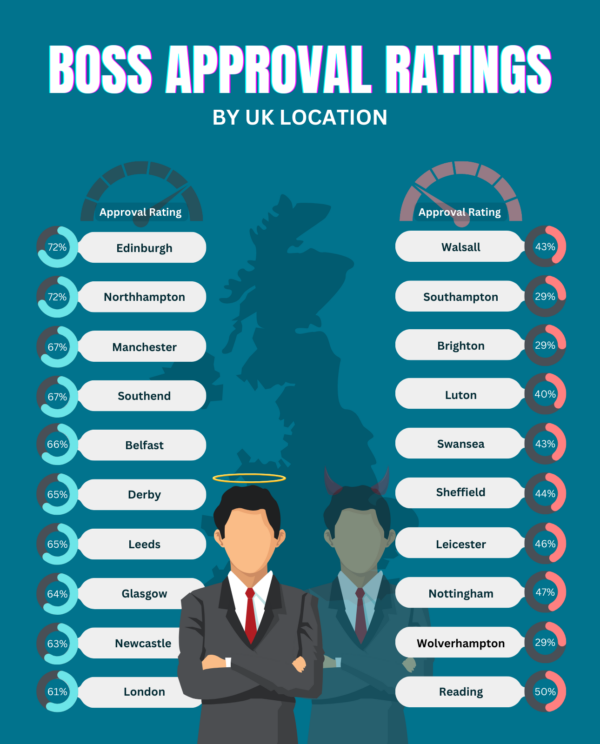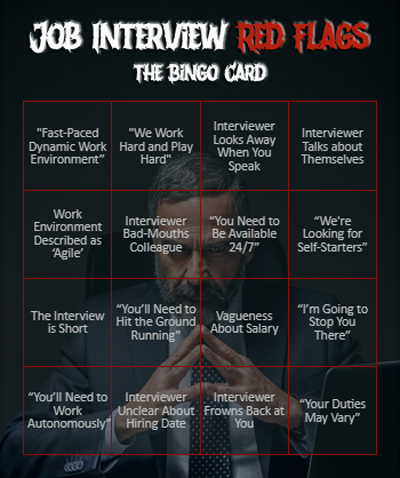
Horrible Bosses

-
Updated: 4th Dec 2024
What do people in the UK *REALLY* think of their bosses?
In the workplace, a great deal of success comes down to how hard you work, the qualifications you attain, and the way you present yourself.
But the one thing that really is down to the luck of the draw is your boss. Some bosses can change your life in incredible ways – one in Austria even donated a kidney to an employee! – and some bosses… well, it can feel like they’re more likely to ruin your life.
BestNewBingoSites conducted some research to find out what people in the UK really think of their bosses. We’ll reveal which cities in the UK are home to the best and worst bosses of all, and we break down what makes a ‘good’ or ‘bad’ boss, as well as offering up a range of helpful tips for handling sticky workplace situations.
We surveyed 2000 people to get the lowdown on what they really think of their bosses. We also spoke to Sara – best known as @newforestsara to her 80k followers on TikTok – who is an HR and Operations manager, with over 20 years of management experience in different industries, and a self-proclaimed employment law nerd.
Best and Worst Bosses in the UK
Where in the UK is home to the best bosses? Our study aimed to find out.

| Best bosses in the UK | Worst bosses in the UK |
|---|---|
| 1. Edinburgh | 1. Walsall |
| 2. Northampton | 2. Southampton |
| 3. Manchester | 3. Brighton |
| 4. Southend | 4. Luton |
| 5. Belfast | 5. Swansea |
| 6. Derby | 6. Sheffield |
| 7. Leeds | 7. Leicester |
| 8. Glasgow | 8. Nottingham |
| 9. Newcastle | 9. Wolverhampton |
| 10. London | 10. Reading |
Northern cities such as Edinburgh, Manchester and Newcastle were found to have the most liked bosses – perhaps showing that the north’s reputation for friendliness is earned, as a 2015 study by the University of Cambridge suggested – whereas bosses from the Midlands and further south seem to fare the worst overall. This is despite research showing that Northerners in the UK are disadvantaged in many ways – including life expectancy, health and educational outcomes – compared to their Southern counterparts.
The good
So what makes a good boss? This can be a bit tricky to define, as different industries may require different qualities from their managers, and individual preference does affect how bosses are perceived by their employees to some extent.

However, there are some things that seem almost universal in terms of what makes a good boss; according to our survey respondents, it is most important to people that their boss is…
- Fair to all staff (79%)
- Takes staff concerns seriously (73%)
- Communicates clearly (71%)
- Listens to feedback (71%)
- Trusts staff to do their jobs (67%)
‘These results don’t surprise me at all,’ says HR Manager Sara. ‘4/5 are about communication. No one gets taught what good communication looks like in a workplace unless you’ve worked with people who are naturally great communicators in the past.
It’s often thought of as a trait rather than a learnt skill.’
Research by Google supports this, suggesting that communication, active listening and empathy rank among the most important behaviours in managers. Workers consistently ask for bosses to listen to their opinions, thoughts and concerns.
The Bad… and the Ugly!
Well over half (63%) of our sample said they’d had more than one boss they considered ‘bad’. So what makes for a horrible boss? Our survey revealed that it is most frustrating for people when a boss…
- Has unrealistic expectations (75%)
- Treats staff members differently or inconsistently (70%)
- Does not communicate clearly (60%)
- Does not offer support to staff (59%)
- Does not listen to feedback (56%)

In Sara’s experience,
‘the largest issue is around lack of trust with managers. This is caused by a number of things; the most common is not setting clear expectations and standards from day one or changing the targets without warning.
If it feels like you are working on shifting sands, it is very difficult to develop trust in your manager, which sets up an environment that feels like you’re fighting against them rather than working together.”
I’m NOT a Celebrity… Get Me Out of Here!
Celebrities are often rumoured to be horrible bosses. It is alleged that…
- Madonna asked her employees to regularly search the anal cavity of her dogs *heaves*.
- Elon Musk came under fire for several changes he made to employee conditions when he took over Twitter.
- Mariah Carey supposedly expected her children’s nanny to work 24 hours a day without sleep or meal breaks.
Overstepping the Mark
Even worse than day-to-day gripes, it turns out that experiencing a boss who crosses the line. It turns out that this isn’t at all uncommon.
A staggering 80% have had a boss who behaved in a way that raised questions! 69% of those had bosses who broke regulations, and 55% reported their bosses to the appropriate authorities.
Some of our sample’s very worst bosses even broke the law in the workplace. One respondent reported that her boss ‘was using company money as a slush fund and was stupid enough to try and lay the blame on me. I appeared in court as a witness to send him to prison.’ Yikes!
Perhaps unsurprisingly, then, 80% of people say they do NOT consider their boss a friend. Professional boundaries can be extremely helpful in maintaining a healthy working relationship, and keeping your relationship with your boss inside the workplace may help you ensure their view of you is not coloured by your personal life.
Company Culture
Bosses have a huge impact on the overall culture and environment at work; since they’re the ones setting the standards and monitoring behaviour, their beliefs about what is and is not acceptable will have a huge impact on culture.

A recent study at Anglia Ruskin University found that bad bosses could lead to a trickle-down effect, with employees working under a horrible boss found to be more likely to mimic their behaviour, creating a hostile work environment.
Perhaps this is echoed in the fact that 60% of people surveyed said they are not confident that raising an issue with their boss at work would be handled appropriately through official channels.
‘Banter’
Sometimes problems in the workplace can be harder to spot. This is often the case when they take the form of ‘banter’; a culture of jokes and mocking each other can enhance closeness in some workplaces, but in others, it can be a way to excuse bullying and harassment.
66% of people surveyed had worked in a place with a ‘culture of banter’, but surprisingly, just 13% had a negative experience with such a culture. Perhaps people enjoy a laid-back, joking culture more than current literature and wisdom would suggest.
Are there very clear markers of what is acceptable banter and what is not? ‘You never know what people will be offended by. I once told a rude joke about a dog and a duck and it really offended someone, once they said something I apologised and stayed away from that type of humour around them,’ says Sara.

‘Things that are a definite no-go, in my opinion, is any punchline involved any characteristic protected by the equality act.
Those can be seen as bullying and can land a company at Employment Tribunal. If you wouldn’t say it in front of your nan, just don’t say it. Save it for the pub after work!’
Banter is tricky: some camaraderie and humour between co-workers can help to bond a group, but banter can easily tip into bullying, unless clear lines are drawn and maintained by managers.
Sara’s Top Tips for Handling Bad Bosses
So, what do you do if you have a bad boss? There are a few key things you can do, says Sara. Her top tips include:
1. Raise your issue, even if it feels difficult to do so
It’s essential that you document any negative interactions with a boss who consistently behaves badly, and ultimately, it is in your interests to raise a complaint if the problem escalates.
A paper trail can help to protect you, or even serve as evidence in an employment tribunal, should it come to that!
The size of a business can have an impact on how easy it is to report issues. ‘The bigger the company, the easier it is for employees to raise and handle issues, as there are usually set protocols in place and third parties (like an HR department) they can speak to.
In smaller businesses, it’s much harder, as often the boss is also the owner, and they could have family or close friends working there, too, which means raising a complaint would mean discussing it with the boss’s partner, sibling or friend’, says Sara.
‘They also don’t often have immediate access to qualified HR people to be able to talk things through with. If that results in delays, it increases resentment.
In my experience, employees will just quit a small company rather than raise issues, that just leaves the small businesses scratching their heads wondering what they did wrong!’
2. Approach it calmly and rationally
So, what is the best way of handling difficult situations with your boss? ‘Honesty is always the best policy, no matter how awkward it feels,’ Sara urges.
‘You can talk to your boss about situations or behaviours that are toxic without attacking them as a person.
The best way to do this is to ask them for a meeting so you can provide some feedback. Then be honest, be clear and don’t just say what you don’t want them to do: tell them what you want to see more of, as it makes things more productive.’
‘For instance: if your boss micromanages you, say something like: I understand you want to feel in control of the project, but is there something I’m doing that’s putting doubt in your mind?
I’d really appreciate it if we could have regular updates once a day and then you can allow me the freedom to get it done. By micromanaging me, it makes me anxious and ineffective. Would it be reasonable to ask for a single daily update at X time if that suits you?’
3. Look for Red Flags
If you’re currently on the hunt for a new job, there are some things you can look out for in a prospective new manager.
‘You can see in advance if there’s a bad boss lurking before the interview. If they ALWAYS have recruitment ads running for a specific role or location, there’s a reason for that higher turnover of staff and HR hasn’t looked into it or resolved it,’ says Sara.
‘At the interview stage, have a look at the other workers on the way to the office. Do they look up and smile, or say hi, as you go past? Is there a positive buzz in the atmosphere? Or is everyone just heads down, working, looking glum?
In the interview, pay attention to the questions they ask. If there’s a lot about commitment/ loyalty/ work ethic, this could be because they had a perceived issue in the past.’
Ideally, you’ll know the signs to look out for so that you can avoid a toxic boss: prevention is much better than a cure if you can help it! Our Job Interview Red Flag Bingo Card should help with that.

Methodology: Data was collected from 2000 UK-based respondents via Pollfish in January 2023.
At Best New Bingo Sites all of our reviews are completely honest and written by industry experts. We aim to present all our offers as transparently as possible with a full explanation of the terms and conditions. We receive commission from the sites we feature and this may affect how prominently they appear on our site and their position in our listings.